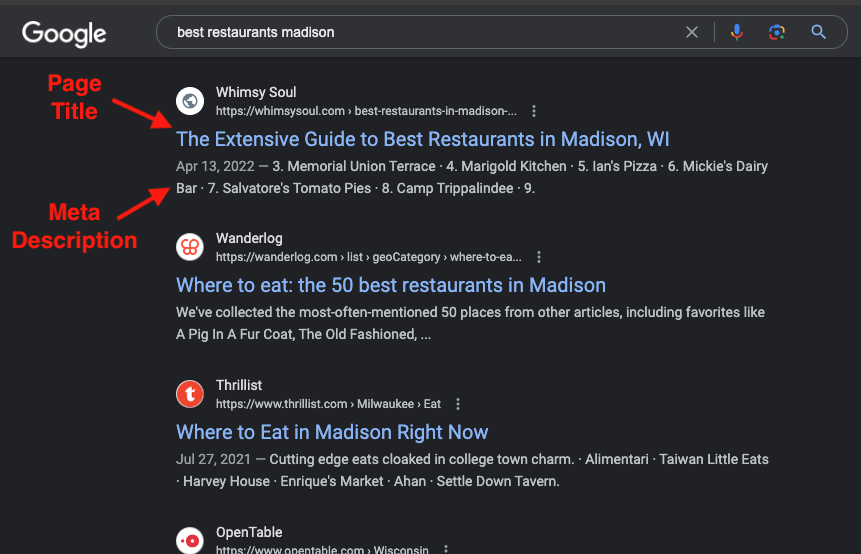
Part of my job at Webstix is to edit and approve new page titles and meta descriptions we write for our SEO clients. What I'm finding is... shocking!
A good amount of the time I go through and approve or edit page titles and descriptions, I'm seeing pages that had standard/default titles and really NO meta descriptions at all. None!
Before you buy some product on Amazon that you've never used before, what do you do? You read the reviews. Those review are copy (text) that helps us know whether or not to purchase a product. So, how do you know if you want to click on a link in a Google results page? You read the title and maybe some of the description. If it looks like that is what you're looking for, you click.
What you need is well written copy (text, verbiage... whatever you want to call it). Good copy should be compelling because good copy helps us make decisions. Good titles and descriptions get clicks.
Once your results start getting more clicks, Google moves your site up in rankings, which gets you more traffic. It's a pretty simple formula.
Page titles and meta descriptions serve as your website's first impression to both search engines and users. They play a critical role in conveying the content and relevance of a web page. Page titles are displayed as the main headline in search results, while meta descriptions provide a brief snippet of information about the page's content. When optimized effectively, these elements can entice users to click on your link, resulting in increased organic traffic.
In other words, they are what search engines use and it's what is seen in search results:

Page titles are one of the most prominent on-page SEO elements. They not only influence click-through rates but also carry substantial weight in search engine algorithms. Titles need to be compelling. That means they should make people want to click. For example, your home page's title should not be just "Home" - in that case, Google actually figures out what to show, but that's not good optimization, at all.
A well-optimized page title should:
Meta descriptions, though not a direct ranking factor, are equally important for SEO. They provide an opportunity to elaborate on the page's content, giving users a preview of what they can expect. Descriptions should also make people want to click.
An optimized meta description should:
Optimizing page titles requires a strategic approach that balances user engagement and search engine visibility. Here are some best practices to help you craft effective page titles:
Crafting compelling and informative meta descriptions is essential for encouraging users to click on your search result. Here are some best practices for optimizing meta descriptions:
Page titles and meta descriptions are essential elements of on-page SEO that can have a significant impact on your website's performance in search engine results. Remember, compelling headlines and meta descriptions are open-ended. They don't give away all the info, but they make people want to click. For example, "The One Thing 99% of Companies Miss With Their SEO" or something like that. But then, deliver on it, of course.
By following the best practices outlined in this article, you can create page titles and meta descriptions that not only improve your website's search visibility but also entice users to click through to your content.
One, good place to get started with SEO, if you endeavor to do it yourself, is Google's SEO Guide.
Remember that SEO is an ongoing process, so regularly monitor and refine your page titles and meta descriptions to stay competitive and maximize your organic traffic.

